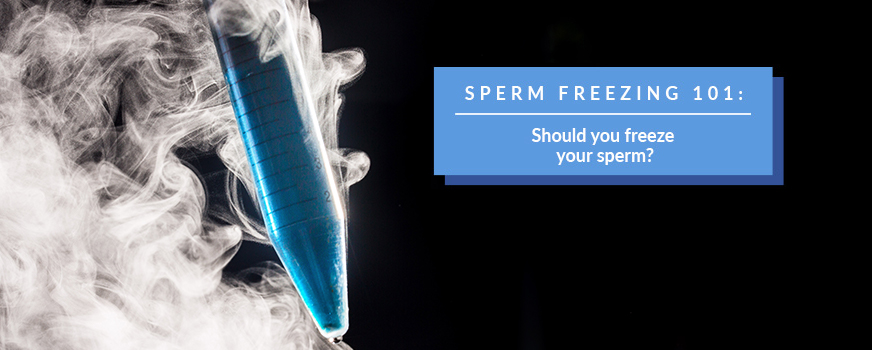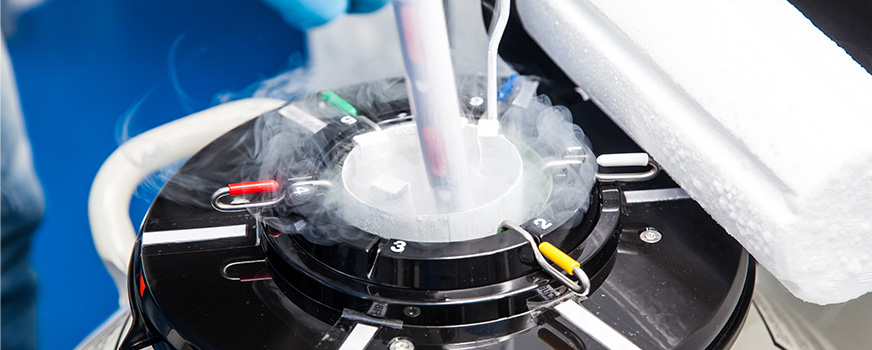
While egg freezing is talked about often, what about freezing sperm? Whether you’re interested in freezing sperm before a vasectomy, because you have a high-risk lifestyle, are going through medical treatment, or just want to preserve your sperm for later, freezing sperm is a great and easy process that can be fairly successful. Learn more about the process to help you determine if sperm freezing is the right approach for you and your fertility journey.
What is Sperm Freezing?
Sperm freezing is the process of collecting, analyzing, freezing, and storing sperm. The samples are later used for fertility treatments or donated to other couples or individuals. Stored sperm can be frozen indefinitely until needed for assisted reproductive procedures, such as in vitro fertilization (IVF), intrauterine insemination (IUI), or sperm donation. This overall process is known as cryopreservation and is sometimes referred to as sperm banking.
The cryopreservation process involves:
- Routine screening for infection (HIV, hepatitis, and rapid plasma reagin test for syphilis)
- Providing a semen sample or undergoing a sperm extraction
- Lab analysis of sperm quantity and quality
- Freezing of viable sperm
- Storage of the sperm indefinitely

How Does Sperm Freezing Work?
A sperm sample can be collected at home or in our clinic, but should only use an approved, sterile lubricant that doesn’t harm the sample quality. Men are also asked to abstain from sexual activity for approximately two days prior to the appointment to allow for the best possible specimen. Once a semen sample is provided it is tested for sperm quantity, shape, and movement within each specimen.
If sperm are not present in the sample or if ejaculation is unable to happen, a surgical retrieval to remove sperm directly from the testicle is another option. Next, samples are separated into multiple vials to be frozen. Lab technicians use specialized cryoprotectant (“anti-freeze”) agents to help preserve and protect sperm cells. The frozen sperm is then stored in the lab until needed. When the time comes, the sperm is thawed, washed, and tested for mobility prior to use in IUI or IVF.
Should I Freeze My Sperm?
The primary benefits of freezing sperm are to allow the patient to preserve their fertility by using their sperm at a later date or to give an infertile couple, an infertile individual, or a lesbian couple a chance to conceive. Common reasons to choose to freeze sperm include:
- Advancing age
- Deteriorating sperm quality or low quantity
- Cancer or other medical reasons
- Pre-vasectomy patients
- Transgender patients
- Career and lifestyle choices
Freezing sperm before a vasectomy is the most common of the above reasons. Whether you fall into the above categories or have a different reason for wanting to go through the process, freezing your sperm is a great option for anyone looking to preserve sperm for future fertility treatments.

How Much Sperm Should I Freeze?
It is recommended to freeze at least two samples to increase the chances of thawing a viable sample in the future. An average ejaculate yields between 2-4 cc in volume. This would create two to four vials for freezing as vials are one cubic centimeter, or 1 cc in volume. A post-thaw sperm count of 20 million motile sperm per cc would be optimal to increase the chances of conception.
Are There Risks to Freezing Sperm?
There are no risks or side effects to collecting semen samples naturally. If surgical extraction is required, there are small risks, as with any surgery, such as bleeding or discomfort. Sperm freezing has been successfully used for decades to help individuals conceive healthy babies. The process is safe, standardized, and continues to improve as technology advances.
The primary concern with sperm freezing is sperm surviving the freezing and thawing process. However, as most semen ejaculations contain an appropriate number of sperm, the chance of having enough healthy sperm for fertility treatments is very high. The capability of the surviving sperm cells to fertilize an embryo is not jeopardized during the freezing or thawing process. Cryopreservation is considered to have no time limit, and stored sperm as old as 20 years have been used to create healthy babies.
Freezing sperm is a generally easy process that yields fairly positive results. If you are considering freezing your sperm, or if you have any questions about the process or any other male fertility topics, schedule an appointment with a fertility specialist at Red Rock Fertility Center.



